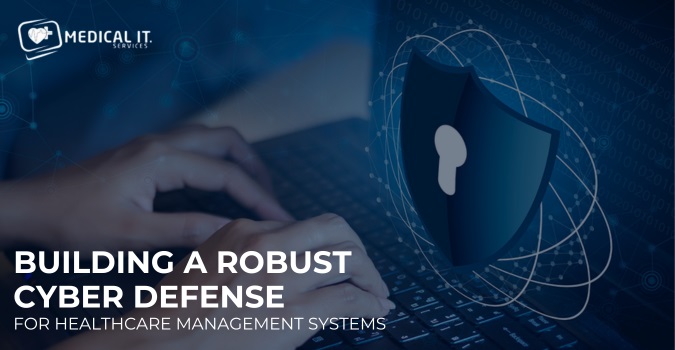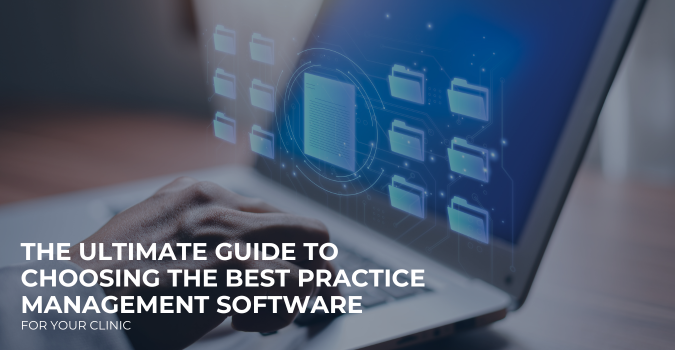In today’s fast-paced digital world, patients expect the same level of convenience and accessibility from…

Building a Robust Cyber Defense for Healthcare Management Systems
Healthcare data is a goldmine for cybercriminals, and a successful attack can have devastating consequences, compromising patient privacy, disrupting critical operations, and incurring significant financial losses. Building a robust cyber defense for healthcare management systems is no longer optional – it’s a necessity. This blog delves into the critical aspects of building a resilient cyber defense for healthcare management systems and highlights how MedicalIT.Services provides comprehensive healthcare cybersecurity solutions.
The Importance of Cyber Defense in Healthcare
Healthcare management systems store a vast amount of sensitive data, including patient records, treatment histories, and personal information. This makes them a prime target for cybercriminals. A breach in these systems can lead to severe consequences, such as:
Loss of Patient Trust: Patients rely on healthcare providers to safeguard their personal information. A data breach can erode this trust, leading to a loss of patients.
- Financial Losses: Cyberattacks can result in significant financial losses due to regulatory fines, legal fees, and remediation costs.
- Operational Disruption: Cyber incidents can disrupt healthcare operations, potentially putting patient lives at risk.
- Reputational Damage: The reputation of a healthcare institution can suffer irreparably following a cyber incident, affecting future business.
What is the role of Cybersecurity in Healthcare?
Cybersecurity plays a vital role in healthcare by safeguarding sensitive patient data, protecting critical medical systems, and ensuring the uninterrupted delivery of care. A strong cybersecurity posture prevents unauthorized access to electronic health records, defends against disruptions caused by malware or ransomware attacks, and builds trust with patients by demonstrating a commitment to data privacy.
Key Components of a Robust Cyber Defense
Risk Assessment and Prioritization:
Every healthcare practice has unique vulnerabilities. Conduct a thorough cybersecurity risk assessment to identify your most critical assets, potential threats, and existing security gaps. Prioritize vulnerabilities based on severity and likelihood of occurrence to focus your resources on the most pressing issues.
Secure Your Healthcare Network:
Your network is the foundation of your healthcare management system. Implement robust security measures including firewalls, intrusion detection and prevention systems (IDS/IPS), and network segmentation to isolate sensitive data. Regularly monitor network activity for suspicious behavior.
Patch Management:
Cybercriminals exploit known software vulnerabilities. Establish a comprehensive patch management program to ensure timely updates for all operating systems, applications, and medical device firmware. Automate patching processes whenever possible to minimize the window of vulnerability.
Access Control and Identity Management:
The principle of least privilege dictates that users should only have access to the data and systems necessary for their job functions. Implement strong access controls, enforce multi-factor authentication, and regularly review user permissions to identify and remove unnecessary access.
Data Encryption:
Encrypt sensitive patient data both at rest (on storage devices) and in transit (over networks), scrambles information, rendering it unreadable to unauthorised users in the event of a data breach.
Staff Training and Awareness:
The human element is often the weakest link in cybersecurity. Regularly train your staff on cybersecurity best practices, including phishing awareness, password hygiene, and safe email handling procedures. Empower them to identify and report suspicious activity.
Incident Response Planning:
No security system is foolproof. Develop a comprehensive incident response plan that outlines the steps to take in the event of a cyberattack. This plan should include data recovery, communication protocols, notification procedures, and eradication procedures to contain the threat. Regularly test and update your incident response plan to ensure its effectiveness.
Compliance and Regulations:
The healthcare industry is subject to various data privacy and security regulations, such as HIPAA (Health Insurance Portability and Accountability Act). Ensure your cybersecurity practices comply with all relevant regulations to avoid hefty fines and reputational damage.
Conclusion
Building a robust cyber defense for healthcare management systems is essential in today’s digital landscape. By implementing comprehensive security measures, healthcare providers can protect sensitive patient data, maintain operational integrity, and uphold their reputation. Investing in cybersecurity is not just a regulatory requirement but a critical component of delivering safe and reliable healthcare services.
MedicalIT.Services: Your Partner in Healthcare Cybersecurity
We at MedicalIT.Services, understands the unique cybersecurity challenges faced by healthcare organisations. We offer a comprehensive suite of healthcare cybersecurity solutions designed to protect your patients’ data, safeguard your systems, and ensure compliance with industry regulations. Our team of specialists can help you assess your vulnerabilities, develop a customized security strategy, implement best practices, and maintain ongoing threat detection and monitoring.
Also Read:




